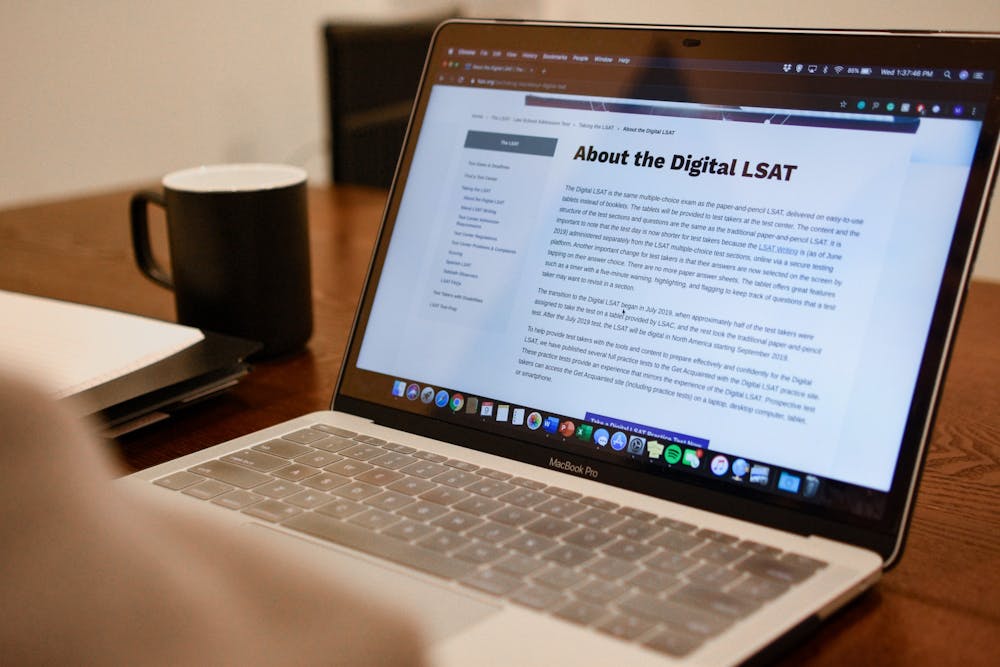
This past semester, students planning to take graduate school entrance exams have faced difficulty in registering due to the pandemic.
Credit: Sharon LeeFrom taking the LSAT at home, to waiting hours for rescheduled MCAT test registrations, Penn students and recent graduates are facing unprecedented changes to standardized testing for graduate school admissions.
Rising College senior Heta Patel was scheduled to take the MCAT on April 25, when the Association of American Medical Colleges notified her on April 1 that the exam was canceled due to coronavirus concerns. Patel then registered to take the test on May 8, when she was notified again on April 15 that the test had been canceled due to the pandemic.
AAMC announced that registration for additional test dates and times would open on May 7 between 6 a.m. and noon. Rising College senior Kelly Jiang said at approximately 7:50 a.m., registration opened, but the website crashed two minutes later.
After nearly seven hours of continuously refreshing the page to see when registration would re-open, Jiang and Patel said the AAMC put them in a virtual waiting room to control website traffic at approximately 2:30 p.m.
“I was lucky in the sense that I only had to wait 40 minutes in the queue to finally get a test date, but I know some people who had to wait three to four hours, and not everyone got a test date,” Patel said.
Jiang said she waited in the virtual queue for 1.5 hours, during which she could not tell where she was in the line and when she would be let in to register for a test date.
“[AAMC] said we’ll let you know once you can be let into the registration system, and you have two minutes to respond. Otherwise, you’re back at the end of the line again,” Jiang said.
She likened the experience to trying to get tickets to the widely popular Coachella Valley Music and Arts Festival.
Jiang, who initially was scheduled to take the MCAT in May, is now registered to take the test on June 20. AAMC, however, has not yet confirmed if this test date is still feasible due to the coronavirus pandemic. Jiang said AAMC will notify her of the exam's status ten days before it is to be conducted.
“There’s just a lot of uncertainty around it, which makes it very demoralizing to have to keep studying every single day for a test that may be happening or may not be happening,” Jiang said.
Patel added that she will have to send out her primary applications to medical schools before even knowing her MCAT score, making it difficult for her to know how to rank her list of medical schools without a “crucial piece to the puzzle.”
“A lot of people are left in the dark, and there is no guarantee that things aren’t going to hit the fan again and July test dates, for example, aren’t going to be canceled again, so everyone is just very much in a limbo right now," Patel said.
2019 College graduate Ben Oh had planned to take the LSAT on April 25, when the Law School Admissions Council canceled the test on April 7. Oh said he did not experience a stressful registration process like MCAT test takers, and easily booked a spot for the May 19 remote LSAT.
LSAC canceled all in-person April, June, and July 2020 tests, and is now offering an online, remotely proctored LSAT called the LSAT-Flex. LSAC reported that 99% of the nearly 10,000 test takers who took the LSAT-Flex between May 18 and May 22 successfully completed the test.
Oh said test takers needed to have access to a web camera, certain web speed, and a service called ProctorU, through which he was paired with a proctor who administered the live exam.
After logging in to ProctorU to take the test, Oh said he waited approximately five to seven minutes before being paired with a proctor. He was then instructed to pan the camera 360 degrees, so the proctor could evaluate the environment in which he was taking the test. The proctor also instructed Oh to show what was underneath his desk and even the back of his glasses to ensure no cheating would be possible, Oh said.
Oh added that taking the test at home did not pose a challenge, as he lives alone without any pets or family members.
“I can imagine for other people who are taking it who have kids or family members, it was probably more stressful for people who are in different situations than I am,” he said.
Oh described taking the online LSAT-Flex at home as a surreal experience.
“I finished and I pressed a button that said ‘Exit Test’ and it was over and I was still home,” he said. “It took about a week until I actually felt like I was done studying, because it just felt like I should keep going because the test felt like a practice test.”
While Oh said he felt comfortable taking the LSAT remotely, Jiang said she is happy with AAMC’s decision not to conduct a remote MCAT like the LSAT-Flex, as an at-home exam would allow for cheating on the heavy content-based test.
“There would be no way that they would be able to ensure that each exam administered was fair and standardized, so I think that it was a good move that they kept it in person,” she said.
The Daily Pennsylvanian is an independent, student-run newspaper. Please consider making a donation to support the coverage that shapes the University. Your generosity ensures a future of strong journalism at Penn.
Donate







